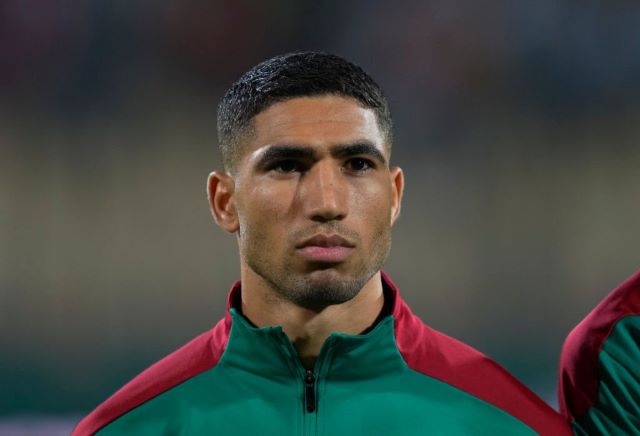The divorce epidemic in the world and its attendant crises in divorce property sharing assumed a different colour last week in the matter of Moroccan, Achraf Hakimi Mouh and his erstwhile wife, Spanish actress, Hiba Abouk.
Hakimi is reported to be Africa’s sixth highest-paid player whose extreme popularity has stuck to him like a lapel since he led his home country, Morocco to the semi-finals of the 2022 FIFA World Cup.
The French magazine, First Mag, had reported that in her claim upon the grant of the divorce by the court, Hiba had requested for half of Hakimi’s assets and fortune. However, the actress, reported the magazine, was shocked when her lawyer found out that Hakimi literally had nothing in his name as the beneficiary of his salary and wealth was his adored mother, Saida Mouh, to whom he transferred his wages for several years. The news reverberated across Spain, France and Morocco and indeed, the rest part of the world.
Hiba is of Libyan and Tunisian descent. Full name Hiba Aboukhris Benslimane, she was born in Madrid as the youngest of four siblings. Her parents, who migrated from Tunisia, had earlier settled in Spain. Hiba studied at the French Lycée, Madrid and graduated at age 18. She thereafter underwent courses in Arabic philology, graduating with a licentiate degree in drama. Renowned for her roles in television series, the most exampled being El Príncipe, in a 2012 show, she starred in comedy series for the first two seasons. She later appeared in a debut El Príncipe crime drama series which was featured on a Spanish free-to-air channel called Telecinco. Watchers of the drama series were estimated to be in the neighbouhood of five million. From 2010 when her acting career began, Hiba was on record to have featured in six movies.
Her husband is the 1998-born Moroccan professional footballer who plies his footballing trade with Ligue 1 Club of the Paris Saint-Germain. He is known to be friends with Kylian Mbappe and recently gained global attention in the reported unusualness which his divorce from Hiba took.
Indications that the marriage between the duo had hit the rock was given by the actress when on March 27 of this year, she took to her Instagram account to announce that she and Hakimi had separated and were waiting for the court to finalize their divorce proceedings. The marriage was blessed with two sons, Amín, 3, and Naim, 1 who were birthed in 2020 and 2022. There was earlier fear that Hakimi’s investigation in Paris on allegation of rape had fuelled the divorce. On March 3, 2023, Hakimi’s indictment was pronounced by a Paris investigating judge who, on the pending allegation of rape he was ensconced in, placed him under judicial supervision. Hakimi had been accused of raping a 24-year old lady right in his Boulogne home while his wife and kids had travelled on holiday. The alleged rape, which took place on the Sunday night of February 26, was broken to the world by the popular tabloid, Le Parisien. Though his lawyer, Fanny Colin, put up a spirited denial of the allegation, the proceedings went on nevertheless. Replying to Le Parisien, Colin had been quoted to have said, “The accusations are false. He is calm and is making himself available to the authorities”. Part of the legal proceedings was a ban placed on Hakimi never to contact the victim of his alleged rape binge. He was however allowed by the court to travel out of the French territory.
Details of the divorce proceedings between Hakimi and Hiba came to the full glare of the world last week, indicating that the couple had been working towards separating legally even before the alleged rape matter cropped up. Suspicions became rife when Hiba expunged her pictures and Hashimi’s from her Instagram page which took place almost immediately the Moroccan international got embroiled in the February rape case. From what was known about Hiba, she had a fortune of hers and probably made the claim to have her pound of flesh on her allegedly adulterous husband.
In comparison with her husband, Hadi is said to be worth the sum of $2million while Hakimi’s net worth is $24 million, eighty percent of which is in the possession of his mother. She is said to be responsible for all the purchases made by Hakimi which included cars, jewelry and clothes. Hakimi’s monthly earning from PSG is said to be $1million, sharing this high worth with Lionel Messi and Neymar da Silva Santos Jnr. The 20 per cent of his paycheck that he keeps is also said to be in the neighbourhood of about $215 weekly. Were the Moroccan defender’s wife to succeed with her claims in the divorce proceedings, she would have got a whopping sum of $8.5million awarded her.
While it was not an issue when they got married, the African conservative abhorrence of a wife older than the husband in matrimony was said to be one of the reasons that triggered the move towards the divorce. A sizeable age gap exists between the duo. While Hakimi is 24, Hiba is 36, a whole twelve years separating them. In an interview in March with El Cierre Digital, Hiba had said her decision to get married to Hakimi was her desire to have a home life, in concert with her husband and children but found out that Hakimi relished the life of a sybarite, partying and living the reckless life of a bachelor.
On the March 27 statement she released via her official Instagram account, Hiba defended her silence on the rape issue but doubled down on her divorce plans. The El Pais, a Spanish newspaper, had quoted her as having said, “After having taken the decision to legally separate and to stop living together whilst awaiting the divorce procedure, which you can imagine, on top of the pain brought about by the separation, as well as having to accept the sadness that a failed project, which I gave my body and soul, brings, I was supposed to face up to this disgraceful act? I needed time to come to terms with this shock. One must trust the legal process, especially considering the gravity of the accusation. Nonetheless, in my life, I always have been, and always will be, on the side of victims.”
Since the details of the divorce property sharing in the proceedings were made known to the world, stands have been taken by people from all walks of life for and against both Hadi and Hakimi. When a legal action is instituted to terminate a marriage, one of the issues that come out of it is how the property which was accumulated during the pendency of the marriage must be shared between the two parties. While this is alien to most of Africa where patriarchy is the order of the day, which is a major bequeathal from traditional African practices of centuries ago, in many other civilized countries, the sharing is pegged on a matrimonial property system. This depends on the particular type of system the parties chose when they were embarking on the marriage.
The African traditional system is in support of divorcing women, for various reasons. Ezinna E Enwereji of the Abia State University’s College of Medicine, Uturu, in her paper entitled Indigenous Marriage institutions and divorce in Nigeria: The case of Abia State of Nigeria, named these reasons as “infidelity, infertility/barrenness impotence, probing a husband’s sexual life inability to reproduce male children and/or large number of children, laziness in taking on assigned gender roles, including farming, cooking late and/or inability to cook delicious food, disrespect to husband and his kinsmen, deviant actions like stealing, prostitution, witchcraft, fighting, especially in public, cases of leprosy, tuberculosis, epilepsy and sexually transmitted infections.”
Though divorces were frowned at in Africa, whenever they occurred in the pre-colonial era, the wives lost totally, even losing the right to custody of the children of the marriage. In some societies of Africa, it was even a taboo for a wife to demand from her spouse whether he had extramarital sexual relationships, catching him red-handed notwithstanding. If she does, she might get divorced for this audacity. When such husband divorces the wife, he will return her to her parents and defrost her of all the resources she might have acquired during the marriage or even which they both labored for. He will then demand the repayment of the bride price he paid on her. It does not matter who initiated the divorce. When the bride price is returned, it is a signification that the marriage had come to an end. Even in the case where a marriage is dissolved by the order of the customary court, the court will still hold that “it is the refund of the bride price or dowry that puts to an end all incidents of customary law marriage and not an order of any court dissolving such marriage. Any order dissolving any customary law marriage without a consequent order for the refund or acceptance of the bride price or dowry is meaningless”. The woman thus divorced is visited financial hardship and most of them never recover from it.
While the customary law marriage pretends that there is Settlement of property in it, it is applicable in theory only as an available relief while, in practice, it is non-existent. Among the Igbo, for instance, wives are still viewed traditionally as one of the chattels and property or possession of the husband and thus, whatever she must have acquired while under the roof of the man, stricto sensu, is the man’s. In such a case, it is always very difficult to ascertain what property belongs to the woman upon divorce. Even when assets are singly or jointly acquired, they can only be ceded or parts given to the woman upon the “magnanimity” of the man. Thus, in settlement of property under customary law, it becomes a discretionary relief for the man to grant his exiting spouse settlement of property.
The above must be the reason many men, including Hakimi’s countrymen and women, were fuming at what they considered Hadi’s “legal ploy” to take a half of her husband’s wealth upon the dissolution of the marriage and their excitedness that Hakimi “outsmarted” the actress.
However, many jurisdictions are conforming to the advocacies of feminist activists who have argued that such system was too punitive against the woman and should be reversed. One of the countries that has tinkered with its own divorce property system is South Africa. There, the legal system is based on the inherited colonialists’ model and codified in the Matrimonial Property Act 88 of 1984. It controls the property sharing model. This Act spells out the different matrimonial property systems which are available to couples in the country, depending on the type of marriages or unions that they choose to bind them legally, from civil, customary marriages and civil unions.
In the civil matrimonial property system of South Africa, there exist three main matrimonial property sub-systems. They are, out of community of property and in community of property. The last is what is called the accrual system. In the out of community property system, if a divorce proceedings is instituted, the property in the marriage is very easy to share and the marriage easier to dissolve because each of the party owns its own estate and their individual assets and liabilities, from the beginning of the marriage, have been known and delineated by the two of them as held separately.
In the in community property system, the estates of the spouses are merged to become a single joint estate during the pendency of the marriage and thus, the husband and wife, during divorce proceedings, are forced by law to share all their assets and liabilities. In this system, when dissolution of the marriage is effected, the court will pay all their liabilities and the balance of this joint estate will be divided in equal measure between the spouses.
If the spouses got married through the accrual system, as their estates multiply during the marriage, they will equally share them but retain their individual estate. Whatever is the accrual from these estates will go into their individual separate estate. Another feature of this system is that spouses cannot be held liable for debts incurred and during divorce proceedings, this sharing method automatically governs the dissolution of the marriage and the asset-sharing system.
The Nigerian matrimonial divorce systems under the Act and Customary Law are both clones of the old traditional practice that sees women as chattels and undeserving of partaking in the property of their spouses, upon dissolution of marriage. It is why Nigerian men have been most vociferous in the celebration of the “feat” of Hakimi. There is no doubting the fact that the ordinary rules of property law which are applied in the determination of the property rights of spouses in Nigeria have wrought financial hardship on women who are seen as weaker vessels. It should be known however that, while men are perceived as ones who go out to provide for the home, no financial or material wealth can surpass the glue and hold that women provide for the family.
While the Hakimi case will look as if he was a Smart Alec, there are some pivotal issues that favour him against Haidi. One is that, the marriage was only three years old. Thus, if the request of the Libyan-born actress had been granted, she would have reaped from where she didn’t sow because the footballer must have been amassing his wealth before their marriage. The second issue, which would have availed that marriage, is the benefit of conciliation which Africa usually witnesses in matrimonial disputes but which, I guess, was not available to the ex-spouses due to the nature of the individuality of the west. Now that potential wives have seen the Hakimi case, subsequent men who try to be smart like Hakimi may not be lucky as potential wives will most certainly begin to poke their noses, with audacious scrutiny, into the process and procedure of the wealth of their future husbands.
All said, the Nigerian property sharing model during dissolution of marriage is repugnant to natural justice as it affects women. There should, as a matter of urgency, be a reconsideration of the matrimonial property rights arrangement among spouses that is operational in Nigeria today. This piece calls for a review of the Matrimonial Causes Act 1970, the main law that governs matrimonial relations in Nigeria. This should be done with the view that the concept of due and equitable sharing of “matrimonial property” can be made applicable and operational during the pendency of marriages, as well as the critical stage of divorce in Nigeria.
- Popular columnist, Dr Festus Adedayo sent this in from Ibadan, the capital city of Oyo State











































































